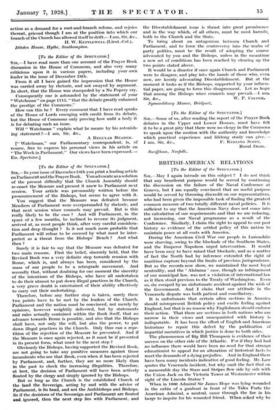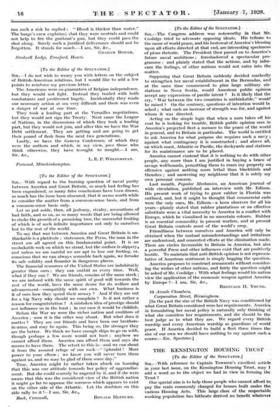BRITISH-AMERICAN RELATIONS
[To the Editor of the SPECTATOR.] SIR, May I again intrude on this subject ? I do not think that any beneficent purpose would be served by continuing the discussion on the failure of the Naval Conference at Geneva, but I am equally convinced that no useful purpose would be served by throwing discredit on our representatives, who had been given the impossible task of finding the greateSt common measure of two totally different naval policies. It is sufficient to say that the American Navy does not come into the calculation of our requirements and that we are reducing, not increasing, our Naval programme as a result of the Conference. Similarly, I claim the right to appeal to our past history as evidence of the settled policy of this nation' to maintain peace at all costs with America.
During the American Civil War our people in Lancashire were starving, owing to the blockade of the Southern States, and the Emperor Napoleon urged intervention. It would
have been easy to have raised that blockade, and as a matter of fact -the North had by inference extended the right of
maritime capture beyond the limits of previous jurisprudence.
But as the records now show, we maintained the most loyal neutrality, and the Alabama ' case, though an infringement of our municipal law, was not a violation of international law as it then stood previous to the Treaty of Washington. Even so, she escaped by an rinfortunate accident against the wish of the Government. And I claim that our attitude in the Venezuela dispute was both patient and conciliatory.
It is unfortunate that certain alien sections in America should misrepresent British policy and excite feeling against England, but that is no reason why Englishmen should endorse their action. That there are sections in both nations whoare narrow in their views and unacquainted with history is indisputable. It has been the effort of English and American historians to repair this defect by the publication of impartial narratives in which justice is done to both sides.
The phenomenon of Big Bill Thompson is evidence of their success on the other side of the Atlantic. For if they had had no influence there would have been no need for that strange educationist to appeal for an alteration of historical facts to meet the demands of a dying prejudice. And in England there have been many incidents indicative of good feeling. Mr. Law quotes the Venezuela incident, but why omit the fact that on a memorable day the Stars and Stripes flew side by side with the Union Jack on the Victoria Tower at Westminster within sight of the Lincoln Statue ?
When in 1860 Admiral Sir James Hope was lying wounded in the cabin of a gunboat in front of the Taku Forts the American Admiral, a neutral, came through the fire in his barge to inquire for his wounded friend. When asked why he
ran such a risk he replied " Blood is thicker than water." The barge's crew explained that they were neutrals and could not help to fire the gunboat's gun, but they could pass the shot along. Surely such a juridical deliverance should not be forgotten. It stands for much.—I am, Sir, &c., Studzrell Lodge, Droiford, Hants. GRAILtM BOWER.







































 Previous page
Previous page